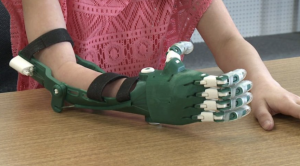Publication on 3D Printed Prosthetics

person wearing 3d printed hand prosthetic
“The Global Care Ecosystems of 3D Printed Assistive Devices” was published in the ACM Transactions on Accessible Computing. EitM Research Assistant, Rachel Rodney, supported this research during her undergraduate program by interviewing and analyzing data from stakeholders in the experience of a user receiving and using a 3D printed prosthetics. Below is the article abstract:
The popularity of 3D printed assistive technology has led to the emergence of new ecosystems of care, where multiple stakeholders (makers, clinicians, and recipients with disabilities) work toward creating new upper limb prosthetic devices. However, despite the increasing growth, we currently know little about the differences between these care ecosystems. Medical regulations and the prevailing culture have greatly impacted how ecosystems are structured and stakeholders work together, including whether clinicians and makers collaborate. To better understand these care ecosystems, we interviewed a range of stakeholders from multiple countries, including Brazil, Chile, Costa Rica, France, India, Mexico, and the U.S. Our broad analysis allowed us to uncover different working examples of how multiple stakeholders collaborate within these care ecosystems and the main challenges they face. Through our study, we were able to uncover that the ecosystems with multi-stakeholder collaborations exist (something prior work had not seen), and these ecosystems showed increased success and impact. We also identified some of the key follow-up practices to reduce device abandonment. Of particular importance are to have ecosystems put in place follow up practices that integrate formal agreements and compensations for participation (which do not need to be just monetary). We identified that these features helped to ensure multi-stakeholder involvement and ecosystem sustainability. We finished the paper with socio-technical recommendations to create vibrant care ecosystems that include multiple stakeholders in the production of 3D printed assistive devices.
3D printed prosthetics are an example of equitable making, which is a core value of the EitM Lab. 3D printing prosthetics meets the needs of several intersecting barriers – accessibility, affordability, and flexibility in terms of directly personalizing the devices. The 3D models of prosthetics can be modified for use while playing sports, such as throwing a tennis ball, or altering the prosthetics over time to fit children as they grow. The additional bonus of being able to choose what colors the prosthetic can be makes them more personable so users can design them to align more with their identity.


 Photo by ZMorph All-in-One 3D Printers on Unsplash
Photo by ZMorph All-in-One 3D Printers on Unsplash